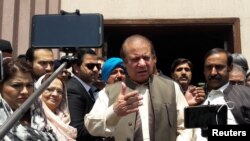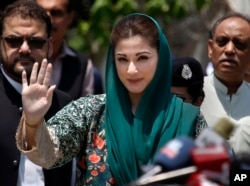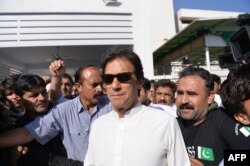An anti-corruption court in Pakistan sentenced former Prime Minister Nawaz Sharif to 10 years in prison on Friday and fined him more than $10.5 million for failing to explain how he and his children acquired expensive overseas property.
The court also gave his daughter and political heir, Maryam Nawaz, a seven-year term. She was fined more than $2.5 million for "abetment" in concealing her father's overseas assets, and her husband, Muhammad Safdar, was given a one-year term.
Sharif's two sons, Hassan Nawaz and Hussain Nawaz, also were among the defendants. Prosecutors said both of them avoided the trial from the outset, and they could not be sentenced in absentia under the circumstances.
Prosecutor Sardar Muzaffar Abbasi told reporters the court also had ordered that the properties, located in an upscale part of London, be confiscated by the Pakistani government.
Sharif and his daughter are in London, where he is attending to his wife, Kulsoom, as she undergoes cancer treatment.
Speaking to reporters in London with his daughter, hours after the court announced its verdict, Sharif denounced the ruling and vowed to return to Pakistan and face prison. However, he said his wife's poor health was keeping him from going back to his country immediately.
Friday's verdict relates to luxury apartments that collectively make up a single mansion, known as Avenfield. The property is worth at least $9.3 million.
Sharif allegedly is a beneficial owner of the property along with his two sons and daughter and her husband, Safdar. Sharif's sons hold British nationality and fled to London while the corruption charges against them were under investigation in Pakistan. They have avoided court appearances, saying Pakistani laws are not applicable to foreign nationals. The court has declared them fugitives. There is no extradition treaty between Pakistan and Britain.
"This verdict sends a strong message to those who have made money through corruption and stashed away ill-gotten money from this country that the judicial system in Pakistan is strong enough to trace and punish you for your crime," prosecutor Abbasi noted.
The prosecution said it successfully established with evidence its case that the Sharif family owned the property since 1993 but had never revealed it to election authorities in Pakistan or to the national parliament. Prosecutors argued the expansive property was bought with money Sharif illegally acquired and laundered via his overseas accounts during his two terms as prime minister in the 1990s.
The prosecution maintained that throughout the trial, Sharif and his family could not explain how they paid for the units. The family denies any wrongdoing and says the corruption charges against Sharif are politically motivated.
WATCH: VOA's Ayesha Tanzeem outside the courtroom in Islamabad
The court ruling was the latest blow to the beleaguered former prime minister. He was forced to leave office in 2017 after the Supreme Court barred him from holding public office for the rest of his life for concealing a salary from his son's Dubai-based company.
The law minister of the caretaker Pakistani government, Ali Zafar, told local media that authorities were determined to fully implement the court order, and that a letter would be written to the British government on Monday to seek its cooperation in bringing the defendants back to Pakistan.
Friday's ruling came amid widespread allegations that the military is meddling in politics and muzzling the media to keep Sharif out of politics and achieve favorable results in national elections being held July 25. Maryam and her husband are candidates in the upcoming polls, but Friday's convictions automatically have disqualified them from contest.
Sharif was dislodged from power by a presidential decree in the early 1990s on charges of corruption and mismanagement of Pakistan's national economy. A bloodless military coup in 1999 ousted Sharif during his second stint in office, and he was later exiled to Saudi Arabia.
The deposed prime minister returned to Pakistan seven years later. He contested the 2013 national election and took charge as prime minister for a record third time.
The ousted Pakistani leader's younger brother, Shehbaz Sharif, who is now leader of the former ruling Pakistan Muslim League-Nawaz (PML-N) party Sharif once led, rejected the court ruling as a "dark chapter" in the country's political history. He vowed to use all available legal options to challenge it. Under the law, one convicted of a crime has 10 days to appeal the verdict.
Sharif and members of his PML-N party allege the corruption cases are aimed at enabling the opposition Pakistan Tehrik-e-Insaf (PTI) party, led by cricketer-turned-politician Imran Khan, to win the coming polls.
The military and the country's chief justice deny the charges. The army spokesman, Major-General Asif Ghafoor, said his institution is working only to assist election authorities in organizing a free and fair poll.
Khan, who has been pressing for an investigation into Sharif's London properties, denies he is colluding with the military against the former Pakistani leader. The opposition politician maintains his years of anti-corruption campaigning have resulted in holding the nation's most powerful person accountable for the first time in its 70-year history.
Addressing an election rally in the northwestern district of Swat, Khan hailed Friday's verdict as "the beginning of a new Pakistan" and said the struggle against corruption begun two decades ago had finally produced results.
Sharif's disqualification from politics and pending corruption trial in several other cases have prompted dozens of defections from his party. Although Sharif can never return to politics because of the ban, observers say the former prime minister still maintains enormous influence over the PML-N.






